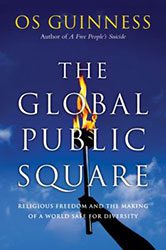 Although I come from the progressive theological and political wing of the Christian family, I always appreciate Os Guinness’ reflections. I am very appreciative of his new book The Global Public Square. Though I take a slightly different path, I find his reflections typically spot on in their assessment of social and cultural trends. As a pastor of a congregation within the United Church of Christ (South Congregational, Centerville, MA), which seeks to welcome people wherever they are on life’s journey, I am committed to thoughtful, affirmative, and respectful diversity. I believe that our response to diversity is a profoundly theological issue and that our vision of God shapes our response to the “holy otherness” of our fellow humans. Accordingly, my response to Os Guinness’ The Global Public Square is intended to be an invitation to mindful theological reflection among my fellow Christians, conservative, liberal, and in between.
Although I come from the progressive theological and political wing of the Christian family, I always appreciate Os Guinness’ reflections. I am very appreciative of his new book The Global Public Square. Though I take a slightly different path, I find his reflections typically spot on in their assessment of social and cultural trends. As a pastor of a congregation within the United Church of Christ (South Congregational, Centerville, MA), which seeks to welcome people wherever they are on life’s journey, I am committed to thoughtful, affirmative, and respectful diversity. I believe that our response to diversity is a profoundly theological issue and that our vision of God shapes our response to the “holy otherness” of our fellow humans. Accordingly, my response to Os Guinness’ The Global Public Square is intended to be an invitation to mindful theological reflection among my fellow Christians, conservative, liberal, and in between.
I want to begin with the affirmation that God loves diversity. In our lively, interdependent, and evolving universe, diversity abounds in flora and fauna. Survival and growth depend on diversity and even though diversity may lead to struggle, the upward reach of evolution and the moral arc of history depend on the creative interdependence of unique and diverse individuals, cultures, ethnicities and races, gifts and talents, lifestyles and sexual identities. The diversity of life is not a call to undifferentiated relativism, but an acceptance of otherness, indeed, the gentle though not-uncritical promotion of otherness, provided it does not undermine the bases of healthy and life-supporting community. Freedom is never absolute but contingent on the well-being of the community, congregation, and planet.
Historically religion becomes tyrannical when it blesses uniformity, establishing one orthodoxy, liturgy, polity, creed, and sexuality as absolute, and defining “others” as heretics, unworthy of ethical, theological, or political consideration. I often ponder how Christianity might have evolved: if the writings of the heterodox gnostic Christian groups were included, like the Apocrypha, in the scriptural canon; if Augustine had recognized wisdom in Pelagius’ vision of human agency and goodness rather than making the Celt’s name an anathema; if East and West had not split over interpretation of creeds; and Protestants and Catholics found ways to redefine and transform authority and understandings of the relationship of grace and effort. Perhaps, Christianity would be a healthier religion.
A monolithic God ultimately distrusts diversity and inspires believers to persecute otherness. An unchanging God also threatens diversity. A God who exists in unchanging perfection, having chosen the elect and the lost, tempts believers to clearly divide the world into in and out, saved and unsaved, righteous and unrighteous, and worthy and unworthy of basic human rights. If truth is static and settled, then those we presume to be in error have no rights to voice or freedom.
A living God, evolving with the world, active in every part of the world, seeking wholeness for everyone, in other words, the God of dynamic omnipresence, encourages diversity. If, as John’s Gospel proclaims, the true light shines on everyone, then we must accord some light – something of the divine – to every person; we must also accord “others” the possibility of sharing some of the truths we hold, even if we understand truth differently.
A universal and cosmic God promotes respect for diversity. I constantly remind congregants and colleagues that we live in a universe that is nearly14 billion years old and that is made up of over 125 billion galaxies (and counting!). This ought to be enough to inspire humility. Our truths may be “saving,” that is, they may transform our lives in healing ways, giving us confidence about this life and eternity. Our “saving” truths are also partial and limited. In a grand universe and a diverse planet, there must be many paths of salvation. The only response to such majestic divinely-inspired and cosmic and planetary diversity is humility. Humility does not preclude us from value judgments, ethical actions, and enforcing the laws of our community; it awakens us to a holy relativity that allows those with whom we disagree to have voice and a place at the table of pious pluralism.
A lively, evolving, and diversity-affirming approach to life is enshrined in the Christian doctrine of the Trinity, especially the Orthodox Christion image of perichoresis, “the dancing, interactive trinity.” Each member is uniquely her or himself, but also one in spirit and intent, spinning off wondrous diversity with every movement. A large-spirited lively and moving God inspires believers of stature, large-souled persons, who embrace otherness while maintaining fidelity to their own evolving understanding of God.
















